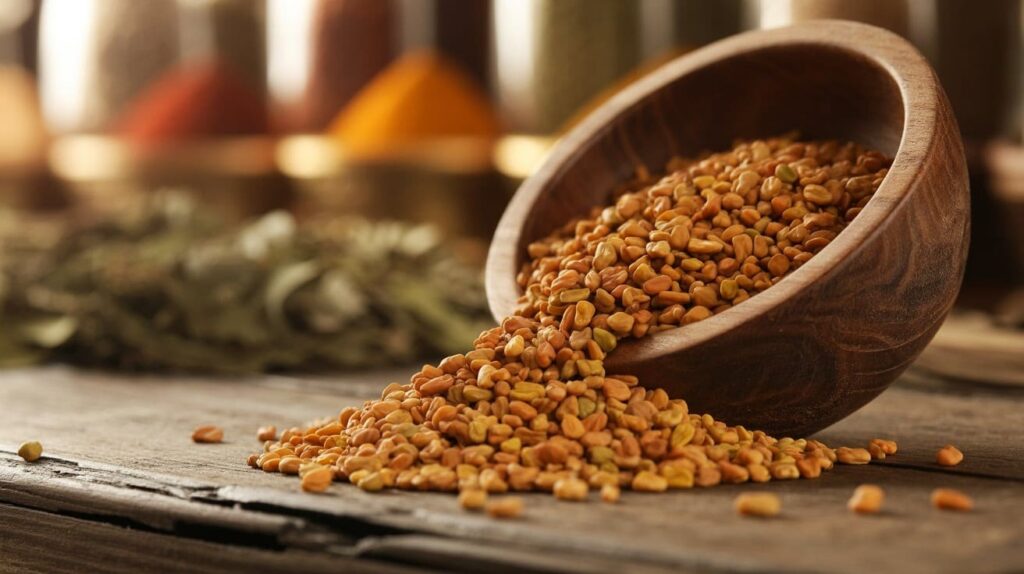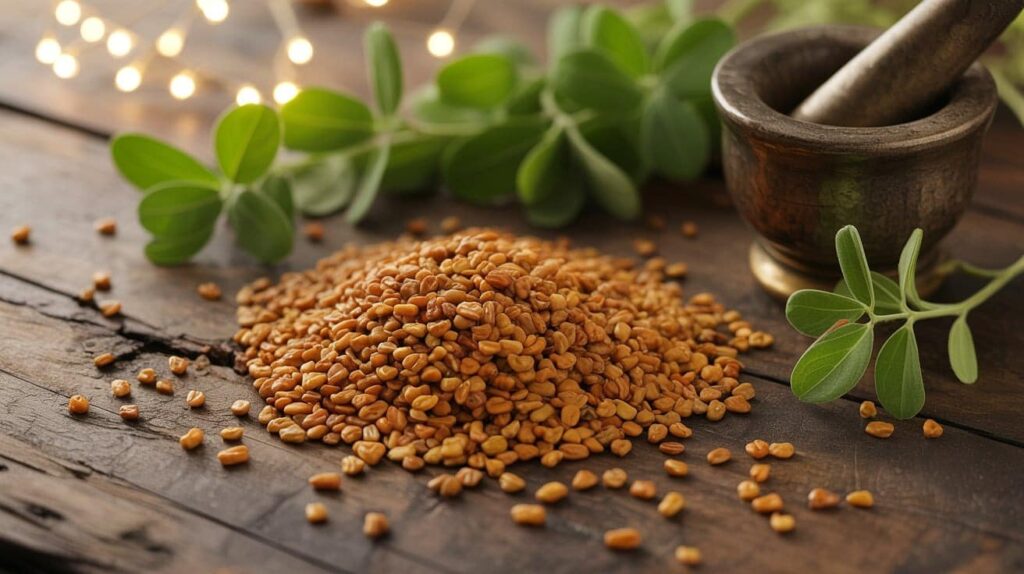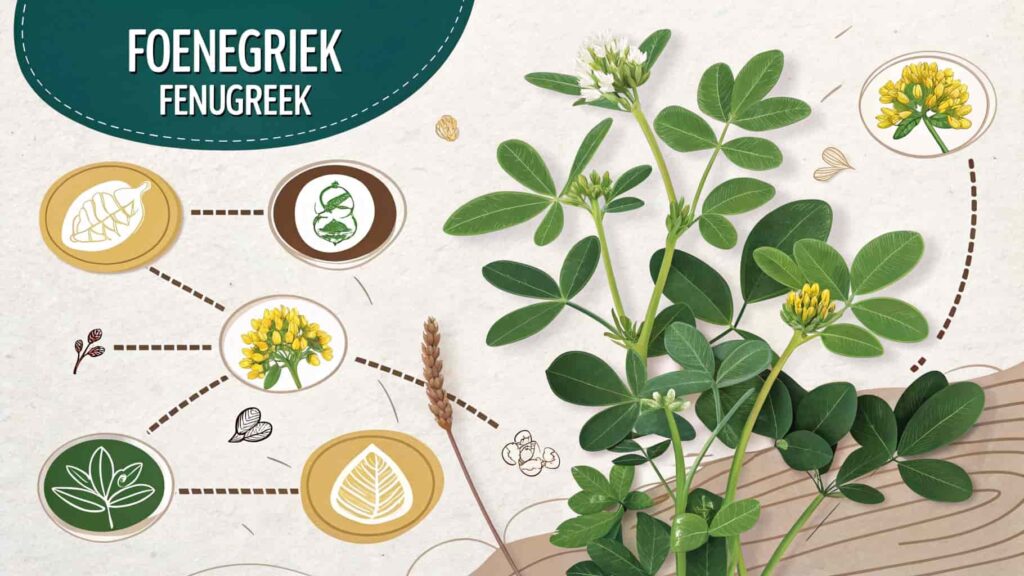Foenegriek – 7 Powerful Health Benefits You Shouldn’t Miss!
Foenegriek, more commonly known worldwide as fenugreek, is a spice and herb that has traveled through centuries, cultures, and continents, leaving its mark as both a culinary delight and a natural medicine. What makes foenegriek fascinating is its dual role—enriching meals with a distinct flavor while also being cherished for its remarkable health benefits.
Stay tuned with us, we will dive deep into the world of foenegriek: its origins, cultural significance, nutritional value, medicinal benefits, culinary uses, modern scientific research, and practical ways to integrate it into everyday life. Whether you’re curious about spicing up your cooking or exploring natural remedies, foenegriek is an ingredient worth your attention.
What Is Foenegriek?
Foenegriek is a versatile plant that belongs to the Fabaceae (legume) family, native to the Mediterranean region, South Asia, and parts of Africa. The plant has clover-like green leaves and small white or yellow flowers, but it is the seeds that have gained the most recognition worldwide.

These tiny amber-colored seeds carry a slightly bitter, nutty flavor with sweet undertones, often compared to maple syrup when roasted or ground. Both the seeds and the leaves are used in different cuisines and traditional remedies, making foenegriek a truly multifunctional ingredient.
The Historical Roots Of Foenegriek – Ancient Healing Secrets!
The story of foenegriek begins thousands of years ago:
- Ancient Egypt (4000 BCE): Archaeologists have found foenegriek seeds in tombs, highlighting its sacred role in both food and embalming rituals. Egyptians believed it supported health and preservation.
- Greece and Rome: Foenegriek was used as a medicinal herb for digestive health and respiratory conditions.
- India: In Ayurvedic medicine, foenegriek became a staple for balancing the body’s doshas, especially in improving digestion and boosting strength.
- Middle East & Africa: It was widely used in bread, stews, and herbal tonics.
This long-standing legacy illustrates why foenegriek remains relevant even in today’s health-conscious and culinary-focused world.
Why Is Foenegriek Regaining Attention Today?
Foenegriek is making a big comeback, and it’s not just because of old traditions. People today are paying more attention to it for many reasons:
- Backed by Science: Modern research is proving what ancient healers already knew—foenegriek has real health benefits.
- Part of Functional Foods: More people now want foods that not only taste good but also help with health, and foenegriek fits right in.
- Rising Global Cuisine: With Indian, Middle Eastern, and Mediterranean foods becoming popular everywhere, foenegriek is showing up in more kitchens.
- Natural Remedies Trend: Many prefer plant-based solutions for digestion, lactation, and overall wellness, and foenegriek is often recommended.
- Everyday Use Made Simple: From teas to curries, it’s easy to add foenegriek to daily meals without changing your cooking style too much.
What Is the Nutritional Composition of Foenegriek?
Foenegriek seeds are tiny but packed with nutrients. They contain a balance of carbohydrates, proteins, healthy fats, vitamins, and minerals that make them both a food and a natural remedy. Below is a detailed breakdown:
| Nutrient | Per 100g | Why It’s Good |
|---|---|---|
| Calories | ~323 kcal | Gives energy. |
| Carbs | ~58 g | Fuels the body. |
| Protein | ~23 g | Builds muscles. |
| Fat | ~6 g | Healthy energy source. |
| Fiber | ~25 g | Aids digestion. |
| Iron | ~33 mg | Keeps blood strong. |
| Calcium | ~176 mg | Strengthens bones. |
| Magnesium | ~191 mg | Supports muscles and nerves. |
| Potassium | ~770 mg | Good for heart health. |
| Vitamins (A, B, C) | Small amounts | Boosts immunity and energy. |
Health Benefits Of Foenegriek – Why This Herb Is Powerful!
Foenegriek is more than just a kitchen spice—it’s a natural remedy that has been trusted for centuries. Modern science is now confirming many of its traditional uses, making it a powerful seed for both everyday wellness and specific health needs.

- Supports Digestive Health: Foenegriek is traditionally used to reduce bloating, gas, and indigestion. Its high fiber content supports bowel regularity and overall gut health.
- Helps Regulate Blood Sugar: Modern research highlights foenegriek’s ability to lower fasting blood glucose and improve insulin sensitivity, making it particularly helpful for individuals with Type 2 diabetes.
- Boosts Lactation in Mothers: Foenegriek is one of the most well-known natural galactagogues. Nursing mothers often use it to increase milk production, supported by centuries of anecdotal evidence and some clinical studies.
- Promotes Heart Health: By potentially lowering LDL cholesterol and supporting healthier lipid profiles, foenegriek plays a role in cardiovascular well-being.
- Hormonal Balance and Women’s Health: Foenegriek seeds contain compounds that may help with PMS symptoms, menopause discomfort, and even hormonal regulation in women.
- Anti-Inflammatory and Antioxidant Effects: The antioxidants in foenegriek help reduce oxidative stress, while its natural anti-inflammatory compounds can soothe joint pain and minor inflammations.
How Is Foenegriek Used in Cooking?
Foenegriek isn’t just valued for its health benefits—it’s also a favorite in kitchens around the world. Both its seeds and leaves bring unique flavors to everyday meals, baked goods, and even drinks. Here’s how it’s commonly used:
Foenegriek Seeds:
- Commonly toasted and ground into spice mixes such as curry powders.
- Added to stews, lentils, soups, and sauces for depth of flavor.
- Used in pickles and condiments across South Asian cuisine.
Foenegriek Leaves:
- Fresh leaves are used in Indian dishes like methi paratha and methi chicken.
- Dried leaves (known as kasuri methi) are sprinkled for aroma in curries and butter chicken.
Baking and Beverages:
- Seeds can be infused into teas, giving a nutty, slightly sweet flavor.
- Ground foenegriek adds complexity to bread, muffins, and even energy bars.
How Does Modern Scientific Research View Foenegriek?
Foenegriek is attracting more scientific interest today than ever before. Researchers are exploring how such a small seed can deliver such powerful health effects. Some studies show that it may help manage blood sugar by slowing down the way the body digests carbohydrates.
Other findings suggest it could play a role in lowering cholesterol, which supports heart health. There’s also early evidence that foenegriek may help with appetite control and provide hormonal support for both men and women. With growing research, this ancient spice is now being recognized as a modern natural remedy with real potential.
What Are Practical Ways to Incorporate Foenegriek Into Daily Life?
Adding foenegriek to your routine doesn’t have to be complicated. Many people use the seeds in cooking—sprinkled into soups, stews, or even baked into bread for a nutty flavor. Ground foenegriek can be blended into smoothies or teas for a simple daily boost.
The dried leaves, known as kasuri methi, are also a favorite in curries and sauces for their rich aroma. For those who prefer convenience, foenegriek supplements are widely available in capsule or powder form. With so many options, it’s easy to enjoy its benefits in a way that suits your lifestyle.
How Is Foenegriek Available in Supplement Form?
Not everyone has the time to cook with foenegriek every day, and that’s where supplements come in handy. They offer a simple and reliable way to enjoy its benefits without much preparation. Whether you’re looking for energy, digestion support, or hormonal balance, foenegriek supplements can fit easily into your daily routine.

For those who prefer convenience, foenegriek is available as:
- Capsules (standardized extracts).
- Powdered forms for shakes and recipes.
- Tea blends combining foenegriek with other herbs.
Important: Always choose high-quality supplements from reputable brands, and consult a healthcare professional before use, especially for pregnant women or individuals on medication.
What Should You Know About the Safety, Side Effects, and Precautions of Foenegriek?
While foenegriek offers many health benefits, it’s still important to use it wisely and be aware of possible side effects. A little caution goes a long way in making sure you enjoy this spice safely.
- Digestive Issues: Taking too much foenegriek may cause bloating, gas, or mild diarrhea.
- Allergic Reactions: Since it’s part of the legume family, people allergic to peanuts or chickpeas should be cautious.
- Pregnancy Concerns: High doses are not recommended for pregnant women because they may affect hormone levels or uterine activity.
- Medication Interactions: Foenegriek may interact with medicines for diabetes or blood thinning, so check with a doctor first.
- Start Small: Begin with small amounts to see how your body responds before adding more.
Keeping these simple points in mind can help you enjoy foenegriek’s goodness without any unwanted effects.
Tips For Beginners Trying Foenegriek – Need To Know!
If you’re new to foenegriek, the best approach is to start small and let your taste buds adjust. A pinch of seeds in soups or a light tea can be a gentle way to experience its flavor. As you grow comfortable, you can try adding the dried leaves to curries or mixing the seeds into bread dough for a nutty twist.
Many people also enjoy pairing it with warming spices like cinnamon or cumin, which balance its natural bitterness. The key is consistency—using it regularly, even in small amounts, can make a bigger difference than trying it once in a while.
Future Of Foenegriek In Modern Living – What’s Next?
Foenegriek’s journey from an ancient spice to a modern wellness ingredient is far from over. With more research highlighting its health benefits, it is likely to become an even more common part of natural medicine and healthy eating. Chefs are also experimenting with new ways to use it in global cuisines, giving this traditional spice a fresh identity.

At the same time, supplement makers are finding innovative ways to make it easier to consume, from teas to powders and capsules. As interest in natural remedies and functional foods continues to grow, foenegriek seems set to play a bigger role in everyday life.
FAQs:
Can foenegriek really help with blood sugar control?
Research suggests that foenegriek may slow down the digestion of carbohydrates. This can help keep blood sugar levels more stable, especially for people with Type 2 diabetes. While promising, it should not replace prescribed medication. Instead, it works best as a supportive natural aid.
Is foenegriek safe for everyday use?
For most people, small amounts of foenegriek in cooking are completely safe. However, very high doses in supplements may cause mild side effects like bloating or diarrhea. Pregnant women are usually advised to avoid it unless a doctor approves. Moderation is the key to safe use.
Can foenegriek boost milk production in nursing mothers?
Yes, foenegriek has long been used as a natural galactagogue to support lactation. Many mothers report increased milk supply within a few days of using it. Some clinical studies also support this traditional use. However, it’s always wise to consult a healthcare professional first.
Does foenegriek help with weight management?
Early studies suggest foenegriek may help curb appetite and create a feeling of fullness. This can naturally reduce overeating and support weight control goals. While not a magic solution, it can complement a balanced diet and exercise. Consistency is what makes it effective over time.
Can foenegriek help with women’s health issues?
Yes, foenegriek has been traditionally used for easing PMS, menopause discomfort, and hormonal balance. Its plant compounds may support estrogen-related functions naturally. While not a cure-all, many women find relief when including it regularly. Always consult a healthcare provider for tailored advice.
Conclusion:
Foenegriek is a simple but powerful herb that has been used for centuries in food, health, and wellness. It is packed with nutrients that can support digestion, balance blood sugar, and even improve energy levels in daily life. Many people also value it for its natural benefits in boosting immunity and overall strength.
Whether used in cooking, as a supplement, or in traditional remedies, it fits easily into a healthy lifestyle. In short, Foenegriek is a small seed with big benefits for both body and mind.
Also Read:
- Gaming Updates Feedgamebuzz – Latest Gaming News Daily!
- YoosFuhl Games – Play The Best Free Online Games Instantly!
- Apkgous – Your Trusted Source For Free Android APKs In 2025!